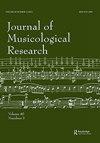About the Authors
IF 0.4
2区 艺术学
0 MUSIC
引用次数: 0
Abstract
Robin James is Associate Professor of Philosophy at University of North Carolina, Charlotte. She is the author of four books: The Future of Rock and Roll: 97X WOXY and The Fight for True Independence (University of North Carolina Press, forthcoming), The Sonic Episteme (Duke University Press, 2019), and Resilience and Melancholy (Zer0, 2015). Isidora Miranda received her PhD in Musicology at the University of WisconsinMadison and is currently a Postdoctoral Scholar at Vanderbilt University. Her work focuses on music and theater performance within the context of the Philippines’ long colonial history. She is currently working on a book project on the Tagalog sarsuwela, cultural nationalism, and constructions of racial and gendered identities in the musical stages of Manila. Her work has been supported by various grants, including the American Musicological Society’s resident fellowship at the Newberry Library and the Mellon Fellowship for Dissertation Research in Original Sources through the Council for Library and Information Resources. Celeste Day Moore is a historian of African American culture, media, and black internationalism and the author of Soundscapes of Liberation: African American Music in Postwar France (Duke University Press, 2021). She is an Assistant Professor of History at Hamilton College in Clinton, NY. Matthew D. Morrison, a native of Charlotte, North Carolina, is an Assistant Professor in the Clive Davis Institute of Recorded Music at the Tisch School of the Arts of New York University. He is the Susan McClary and Robert Walser American Council of Learned Societies Fellow from 2021–2022, where he is in residence at the University of Edinburgh. Matthew is completing his book manuscript, Blacksound: Making Race and Popular Music in the United States (University of California Press, forthcoming). His work has appeared in various publications, including the Journal of the American Musicological Society and the Oxford Handbook of Music and Philosophy, and he contributes creatively as a dramaturg and artistic consultant within the arts. Imani Danielle Mosley is a musicologist, cultural historian, and digital humanist focusing on the work of Benjamin Britten, music, opera, and modernism in Britain post-1945. Her current research addresses digital sonic mapping, acoustics, and rituals in the English churches and cathedrals central to Britten’s sacred music. In addition to her work on Britten, Mosley also specializes in contemporary opera, reception history, queer theory, masculinities studies, and race in 21st-century popular musics. Alon Schab is a musicologist, composer, and recorder player. He wrote his doctoral dissertation on Henry Purcell at Trinity College Dublin. Since 2012 he has been a faculty member in the Department of Music at the University of Haifa, and since 2016, a committee member of the Purcell Society. He is the author of The Sonatas of Henry Purcell: Rhetoric and Reversal (University of Rochester Press, 2018) and of A Performer’s Guide to Transcribing, Editing and Arranging Early Music (Oxford University Press, forthcoming). Jürgen Thym, Professor Emeritus of Musicology at the Eastman School of Music (University of Rochester), is an authority on classical music of the nineteenth and JOURNAL OF MUSICOLOGICAL RESEARCH 2021, VOL. 40, NO. 4, 366–367 https://doi.org/10.1080/01411896.2021.1993684关于作者
罗宾·詹姆斯是北卡罗来纳大学夏洛特分校的哲学副教授。她是四本书的作者:摇滚的未来:97X WOXY和为真正的独立而战(北卡罗来纳大学出版社,即将出版),Sonic Episteme(杜克大学出版社,2019)和Resilience and Melancholy (Zer0, 2015)。伊西多拉·米兰达在威斯康星大学麦迪逊分校获得音乐学博士学位,目前是范德比尔特大学的博士后学者。她的作品专注于菲律宾长期殖民历史背景下的音乐和戏剧表演。她目前正在撰写一本关于马尼拉音乐舞台上的他加禄语sarsuwela、文化民族主义以及种族和性别身份建构的书。她的工作得到了各种资助,包括美国音乐学会在纽伯里图书馆的常驻奖学金和梅隆大学通过图书馆和信息资源委员会的原创论文研究奖学金。塞莱斯特·戴·摩尔是研究非裔美国人文化、媒体和黑人国际主义的历史学家,著有《解放的音景:战后法国的非裔美国人音乐》(杜克大学出版社,2021年)。她是纽约克林顿市汉密尔顿学院历史学助理教授。马修·d·莫里森(Matthew D. Morrison)是北卡罗来纳州夏洛特人,现任纽约大学蒂施艺术学院克莱夫·戴维斯录音音乐学院助理教授。他是2021-2022年Susan McClary和Robert Walser美国学术团体理事会的研究员,他在爱丁堡大学居住。马修正在完成他的书手稿,《黑声:在美国制作种族和流行音乐》(加州大学出版社,即将出版)。他的作品曾发表在各种出版物上,包括《美国音乐学会杂志》和《牛津音乐与哲学手册》,他作为戏剧和艺术顾问在艺术领域做出了创造性的贡献。伊玛尼·丹妮尔·莫斯利是一位音乐学家、文化历史学家和数字人文主义者,专注于本杰明·布里顿的作品、音乐、歌剧和1945年后英国的现代主义。她目前的研究涉及数字声音映射,声学,以及英国教堂和大教堂的仪式,这是布里顿神圣音乐的核心。除了对布里顿的研究,莫斯利还专注于当代歌剧、接受史、酷儿理论、男性化研究和21世纪流行音乐中的种族。Alon Schab是一位音乐学家、作曲家和竖笛演奏家。他在都柏林三一学院写了关于亨利·珀塞尔的博士论文。自2012年以来,他一直担任海法大学音乐系的教员,并自2016年以来担任Purcell Society的委员会成员。他是《亨利·珀塞尔奏鸣曲:修辞与逆转》(罗切斯特大学出版社,2018年)和《表演者转录、编辑和编曲早期音乐指南》(牛津大学出版社,即将出版)的作者。j rgen Thym,伊士曼音乐学院(罗切斯特大学)音乐学名誉教授,是19世纪古典音乐和《音乐学研究杂志》2021年第40卷的权威。4,366 - 367 https://doi.org/10.1080/01411896.2021.1993684
本文章由计算机程序翻译,如有差异,请以英文原文为准。
求助全文
约1分钟内获得全文
求助全文
来源期刊
CiteScore
0.30
自引率
0.00%
发文量
17
期刊介绍:
The Journal of Musicological Research publishes original articles on all aspects of the discipline of music: historical musicology, style and repertory studies, music theory, ethnomusicology, music education, organology, and interdisciplinary studies. Because contemporary music scholarship addresses critical and analytical issues from a multiplicity of viewpoints, the Journal of Musicological Research seeks to present studies from all perspectives, using the full spectrum of methodologies. This variety makes the Journal a place where scholarly approaches can coexist, in all their harmony and occasional discord, and one that is not allied with any particular school or viewpoint.

 求助内容:
求助内容: 应助结果提醒方式:
应助结果提醒方式:


